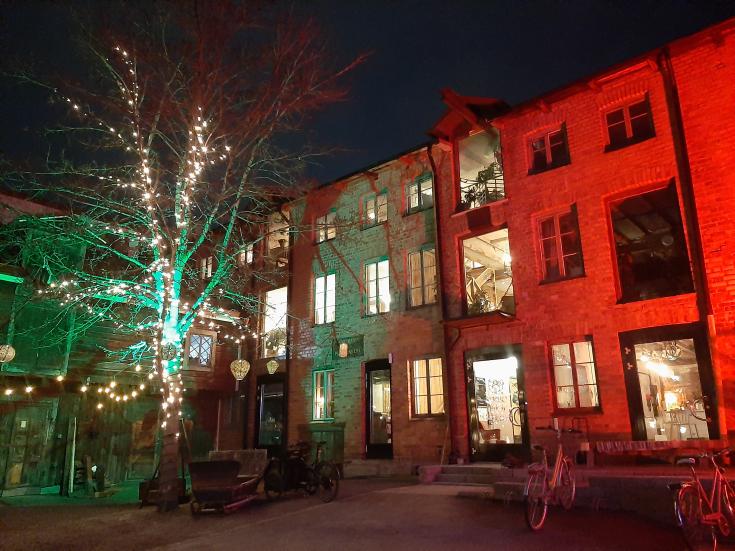Unlocking the potential of remote students

On 9–10 April 2025, the Interreg Europe Policy Learning Platform facilitated an onsite peer review in Östersund, Sweden, to support the municipality’s ambition to make remote students more visible within the local business ecosystem.
Hosted by Östersund municipality in collaboration with Mid Sweden University and Gomorron Östersund, the peer review is part of a broader initiative to establish a Remote Campus — a physical and strategic space that would connect remote learners in the area to local academia and employers, and to community life.
This initiative not only aims to better integrate current remote students, but also to encourage more residents to engage in higher education and lifelong learning. At its heart lies a shared objective: aligning education pathways with local skill needs and unlocking talent that might otherwise remain invisible.
Key policy challenges
-
How can remote students be better integrated into the local community and labour market?
- What should a practical, inclusive, and attractive “Remote Campus” look like?
- How can long-term governance, funding, and stakeholder engagement be secured?
Peers from across Europe
Alongside Erik Gløersen and Mart Veliste, Thematic Experts on ‘More Social Europe’, six excellent peers participated in the peer review:
- Alain Bouhours, French Ministry of Higher Education and Research, France
- Anne-Cécile Fradin, Nevers Agglomeration, France
- Elsa Buet, Yes We Camp, France
- Jane Lewis, UHI Shetland, United Kingdom
- Simon Hensellek, TU Dortmund, Germany
- Will Bennis, Prague University of Economics and Business, Czechia
Their inputs helped generate a rich set of recommendations, drawing on lessons from remote learning hubs, coworking spaces, and community-driven education models across Europe.
Recommendations for job and skills management
Below you can find some recommendations that were brought by the peers during the peer review, drawing on lessons from remote learning hubs, coworking spaces, and community-driven education models across Europe.
Peers proposed a “menu” of Remote Campus models — from university-integrated coworking spaces to dynamic third places combining learning, social events, and cultural programming and to learning spaces targeting groups that for different reasons cannot move to larger cities to study. Independent on the option chosen, a ‘remote campus’ should:
- Be centrally located and physically welcoming, with multifunctional spaces for study, socialising, and well-being
- Ensure services meet the diverse needs of users, based on data and typologies of current and potential students
The importance of community-building and mental health support were extensively addressed. The campus should offer:
- Local tutoring and career counselling
- Embedded academic and psychological support
- Opportunities for co-creation through peer-led events, student councils, and shared responsibilities
- A “moral contract” model, inspired by Campus Connecté in France, was discussed as a way to ensure active participation and commitment.
A hybrid governance structure involving the university, municipality, and private actors is recommended. Flexibility is key — the governance model should allow:
- Adaptive programming and student voice
- Use of external input and rotating roles
- Potential expansion in partnership with Åre or other municipalities
To sustain operations, a diversified funding strategy should be pursued, including:
- EU funding (e.g. ERDF, ESF, Erasmus+)
- National and regional education and employment programmes,
- Revenue-generating activities such as coworking space, hosting training sessions and events
- Local business sponsorships, impact investors, or social impact bonds-inspired funding models
The campus should be a visible and active connector between students and local employers. Recommendations include:
- Skills mapping and early career counselling (even pre-university)
- Hosting job fairs, business breakfasts, and hackathons
- Curating student portfolios to match with company needs
- Facilitating apprenticeships and project-based learning with local businesses and public services
Success hinges on the right people. Tutors, place managers, and coordinators must be well-trained, supported, and connected. Key points:
- Mitigate risks of burnouts among campus tutors and coordinators with realistic expectations and community support
- Track impact with simple indicators (e.g. attendance, employer engagement)
- Consider establishing a community of practice for place managers, building on the French Campus Connecté model
Östersund’s Remote Campus has the potential to become a national pilot — a model for inclusive education, community development, and smart regional talent strategies. Building on peer review insights, the next steps will be to:
- Finalise a locally grounded concept
- Test small-scale initiatives aligned with “open programming”
- Engage more stakeholders in co-creating the Remote Campus vision
More detailed findings will be available in the final peer review report.
More information will be available soon in the follow-up report.
